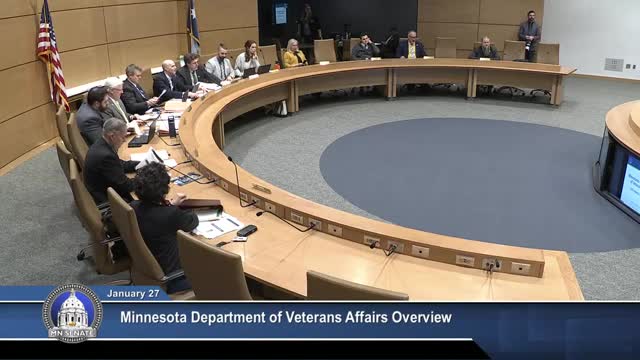Minnesota Department of Veterans Affairs outlines services, housing and suicide-prevention priorities
Get AI-powered insights, summaries, and transcripts
Subscribe
Summary
The Minnesota Department of Veterans Affairs briefed the Senate subcommittee on veterans today, presenting service counts, the agency's programs including veterans homes and cemeteries, homelessness work and a request for operating increases tied to healthcare and programs and services.
The Minnesota Department of Veterans Affairs (MDVA) told the Senate Subcommittee on Veterans and Military Affairs on Jan. 27 that it serves an estimated 286,000 veterans statewide and is prioritizing homelessness prevention and suicide-prevention work while maintaining veterans homes and cemetery operations.
"For the record, my name is Brad Lindsay. I'm the commissioner of the Minnesota Department of Veterans Affairs," Commissioner Brad Lindsay said as he opened the department's overview. MDVA deputies Ben Johnson and Eric Maittinen and government affairs director John Kelly joined the presentation.
MDVA officials said federal estimates show about 286,000 veterans live in Minnesota (roughly 5.15% of the state population) with about 55,000 having served since Sept. 11, 2001. The agency said it operates eight state veterans homes and four state veterans cemeteries, and that the legislature has authorized a fifth cemetery. MDVA also maintains field offices, tribal veteran service officers on reservations, and campus-based outreach for students using education benefits.
Deputy Commissioner Ben Johnson described core programs: federal VA claims assistance, veterans employment and education support, the state's veterans benefits lines including the State Soldiers Assistance Program, a Minnesota GI Bill benefit and a statewide homelessness initiative. Johnson said the Minnesota GI Bill is a "last dollar in" program offering up to $15,000 to eligible Minnesotans and can be applied semester-by-semester for tuition, licensing or on-the-job training.
Johnson described the agency's homelessness work as a top operational priority, noting a by-name Homeless Veterans Registry the department updates regularly and which the agency uses to coordinate housing plans. He said the public dashboard's number is updated frequently; a slide shown to the committee listed 195 names and Johnson said the number had already dropped to 186 during the presentation.
Deputy Commissioner Eric Maittinen reviewed MDVA's health-care services at the veterans homes, including skilled nursing, memory care, domiciliary services, mobile dental, rehabilitation and on-site pharmacy services. Maittinen said the Minneapolis campus includes 300 skilled beds, adult day services and domiciliary care split between Minneapolis and Hastings. He called attention to increasing behavioral-health needs among residents and said the homes have earned external recognitions for quality and satisfaction.
MDVA said staffing and operating totals for FY2024 included 1,253 FTEs, roughly $124.25 million in salary and benefits and $35 million in non-salary expenses. John Kelly, director of government affairs, told the subcommittee the governor's budget includes operating adjustments for both the health care and programs-and-services divisions to cover salary and other rising costs.
The agency also described grant programs and community partnerships: a Minnesota Service Corps model for case management and referral run through contractors such as Lutheran Social Services, grants to veteran service organizations, and a "Support Our Troops" fund primarily financed by specialty license-plate sales. Johnson said MDVA is expanding outreach for food and other basic needs outside the Twin Cities.
MDVA identified two priority initiatives for the session: ending veteran homelessness (using the registry, SOAR assistance for SSI/SSDI applications and tenancy supports) and a statewide veteran suicide-prevention initiative. Maittinen said MDVA is seeking $1.65 million to support a statewide suicide-prevention effort tied to data-driven outreach and community health navigators who would work in non-VA emergency settings.
Why it matters: MDVA's operating posture affects veterans'access to federal benefits, housing supports and long-term care provided by state veterans homes. Budget increases proposed by MDVA would expand operations and cover higher personnel and operating costs that MDVA leaders said are necessary to maintain current service levels.
MDVA officials invited follow-up questions and offered to provide additional data requested by senators, including workforce and veteran-owned business figures.
Ending note: MDVA officials said they will return to the committee with budget requests and follow-up details; the subcommittee left the presentation to hear the Department of Military Affairs.
